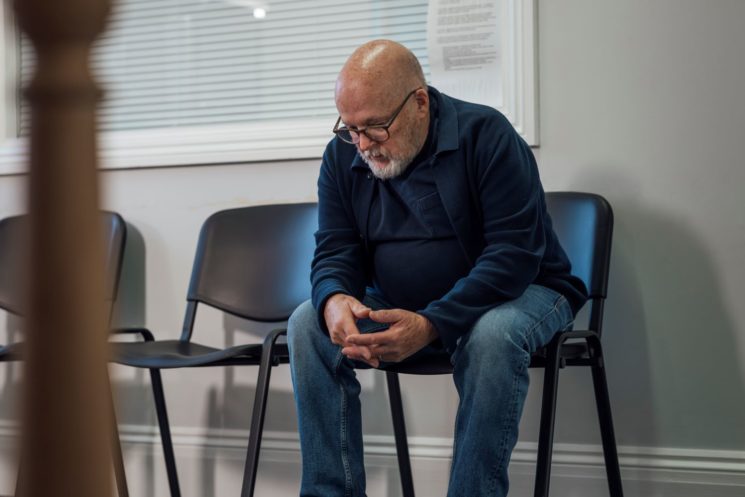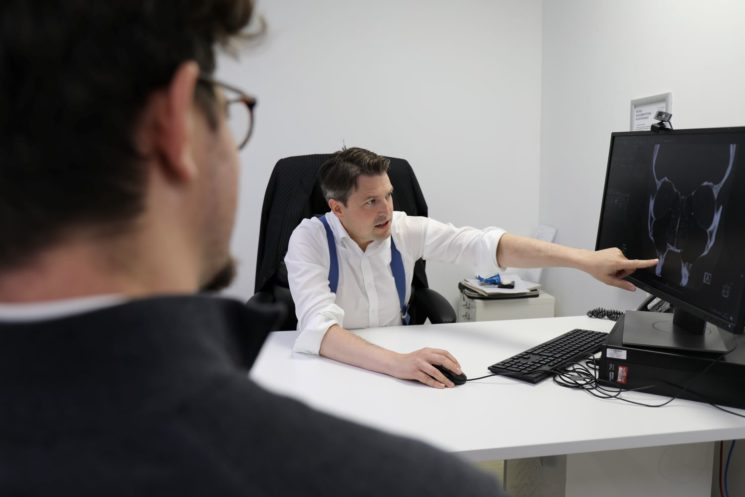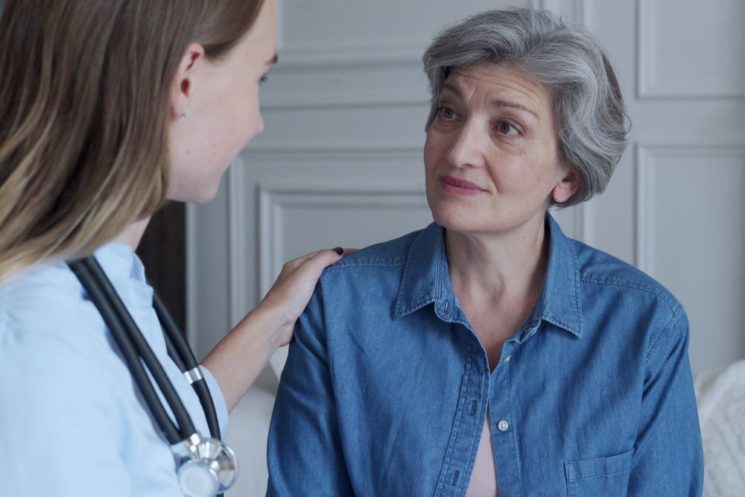
Stomach cancer, also known as gastric cancer, is a cancer that begins in the stomach lining. Although the majority of cases don’t have any obvious cause, it may develop because of lifestyle or environmental factors, or if your stomach contains a bacteria known as Helicobacter pylori (H.pylori).
Dr Andrew Gaya, Consultant Clinical Oncologist at Cromwell Hospital, tells us more about stomach cancer symptoms, diagnosis, and treatment options.
What is stomach cancer?
Stomach cancer, also known as gastric cancer, begins in the stomach lining.
Your stomach is located within the upper left-hand side of your abdomen. Its main purpose is to temporarily store and partially digest food.
The stomach wall is made up of several layers, including the outer lining, muscle layer, supportive tissue, and inner lining. Stomach cancer can occur in any part of the stomach wall, but most begin in the glandular cells in the inner stomach lining; this is called adenocarcinoma.
Stomach cancer symptoms
The symptoms of stomach cancer can be hard to spot, as they often occur in other, less serious conditions as well. Stomach cancer symptoms include:
- upper abdominal pain
- having problems swallowing (dysphagia)
- unexplained weight loss
- heartburn or acid reflux
- symptoms of indigestion (dyspepsia), like burping
- feeling full after eating small amounts
- loss of appetite
- feeling sick (nausea)
- vomiting
- tiredness and fatigue
- dark-coloured stool (poo) – this is a sign of bleeding in the stomach
- a lump at the top of your stomach
Having one or more of these symptoms doesn’t mean you have stomach cancer. However, you should visit a consultant so that they can investigate further.
What causes stomach cancer?
While cancers can and do develop without a clear cause, stomach cancer has been linked to several lifestyle and environmental factors. These include:
- H.pylori bacteria in the stomach – H. pylori is a common type of bacteria that spreads through contaminated food and water, infecting the stomach. In some people, an H. pylori infection attacks the stomach and causes inflammation and ulcers – which is what can lead to the eventual development of cancer.
- Smoking – While smoking is linked to many different cancers, it is the cause of around 15% of stomach cancer cases.
- Being overweight – Being overweight is linked to around 5% of stomach cancer cases. People who are overweight are more likely to develop cancer at the top of the stomach, where it meets the food pipe (the cardia).
- Alcohol consumption – Incidences of stomach cancer are higher in people who consume more than three units of alcohol per day.
Stomach cancer is more common in men than women. Around half of cases are diagnosed in people aged 75 or older.
Types of stomach cancer
Adenocarcinoma is the most common type of stomach cancer. It develops in the gland cells within the stomach, which produce mucus and stomach juices.
There are other types of stomach cancer, but they’re rarer. These include:
- Squamous cell cancer – which develops in the squamous cells covering the lining of the stomach.
- Gastrointestinal stromal tumour (GIST) – a rare type of sarcoma found in the digestive system, usually in the wall of the stomach.
- Neuroendocrine tumours (NETs) – rare stomach tumours that start in the neuroendocrine (hormone-producing) cells of the stomach.
- Lymphoma – a rare type of cancer within the lymphatic drainage system of the stomach.
How is stomach cancer diagnosed?
There are several diagnostics tests that may be conducted if you have suspected stomach cancer:
- Physical examination – Your doctor will feel your stomach to see if there are any swollen, abnormal, or painful areas.
- Blood tests – This will be used to assess your overall health, including how well your liver and kidneys are working.
- Gastroscopy – A gastroscopy uses a long, thin, flexible tube with a small camera to look inside your food pipe (oesophagus), stomach, and the first part of the small bowel (intestine). Your consultant will be able to take tissue samples (biopsies) from any abnormal-looking areas.
There are other tests that you may have if you have been diagnosed with stomach cancer, to check if it has spread:
- CT scan and PET-CT scan – This may be used to see where the cancer deposits are located and if it has spread beyond the stomach.
- Endoscopic ultrasound – This test can be used to check the food pipe and stomach, to see what size the cancer is, if it is attached to anything else, and if it has spread. This test is often used to plan surgery for stomach cancer.
- Laparoscopy – You should have a staging laparoscopy if your stomach cancer is being considered for surgery, to help plan your treatment. A camera is introduced into the abdominal cavity under general anaesthetic to look for any spread of the stomach cancer onto the lining of the abdomen (peritoneum).
Stomach cancer stages
If you are diagnosed with stomach cancer, your consultant will assign it a stage or grade to help guide the optimal treatment plan for your circumstances.
Most cases of stomach cancer are graded using the TNM system. TNM stands for tumour, nodes, and metastases:
- T describes how far the tumour has grown into the stomach wall.
- N describes whether the cancer has spread to the lymph nodes.
- M describes whether the cancer has spread (metastasised) to other parts of the body.
Tumours and nodes will be assigned a number from 0 up to 3 or 4; the lower the number, the lower grade the cancer is.
Metastases are only assigned a 0, meaning the cancer has not spread, or a 1, meaning it has.
Stomach cancer treatment
Once diagnosed, your case will be discussed at a multidisciplinary team (MDT) meeting, which is made up of a panel of medical specialists. This includes oncologists, surgeons, clinical nurse specialists, radiologists, and more. An MDT meeting allows a range of experts to input into your care, providing you with the optimal approach to treatment.
You may be offered one or more of the following treatment options, based on the stage of your cancer.
Surgery for stomach cancer
Surgery is the most common option for patients with localised stomach cancer (meaning it hasn’t spread). This can either involve removing the cancerous cells from the stomach lining (endoscopic mucosal/submucosal dissection, which is done for early tumours) or removing part or all of the stomach (partial/total gastrectomy).
Surgery will usually be paired with chemotherapy for best results and to prevent the return of the cancer. Chemotherapy is often given for two months before and after the operation (perioperative chemotherapy).
Chemotherapy for stomach cancer
Chemotherapy involves the use of anti-cancer (cytotoxic) drugs to eliminate cancer cells. You may have chemotherapy and surgery together, for optimum results (perioperative chemotherapy).
Chemotherapy can also be used in advanced stages or relapse of stomach cancer, where surgery isn’t possible, in order to prolong life. It can be an effective way of controlling symptoms and improving your quality of life.
Radiotherapy for stomach cancer
Radiotherapy uses high-energy beams (X-rays) or radiation to eliminate cancer cells. It is sometimes carried out alongside chemotherapy (chemoradiotherapy). Radiotherapy is sometimes given either before or after surgery for stomach cancer, but not in all cases.
Radiotherapy may also be an option for managing symptoms and controlling the spread of stomach cancer in patients who are unfit for surgery, or for whom the cancer is too advanced for surgery. It can also be used to control symptoms of cancer spread – for example, into the bones (palliative radiotherapy). In cases where there are only a few (up to 5) metastases, high-dose radiotherapy can be used to potentially eliminate the metastatic sites (stereotactic ablative radiotherapy).
Cromwell Hospital is home to one of Europe’s most advanced radiotherapy centres in partnership with GenesisCare. Here, we offer a range of leading-edge treatments including the MRIdian MR Linac, Varian Edge, and Gamma Knife Icon.
Targeted therapies
Trastuzumab is a relatively new medication that is commonly used to treat breast cancer; however, it is also an option for patients with advanced stomach cancer.
Trastuzumab is only used if the cancer is strongly positive for a protein called human epidermal growth factor receptor 2 (HER2) on testing. It works by blocking the growth of HER2, which stimulates stomach cancer. While trastuzumab doesn’t cure stomach cancer, it does slow down its progression. It may be delivered in conjunction with chemotherapy.
Immunotherapy is used in combination with chemotherapy to treat advanced/relapsed stomach cancer. It works by boosting your immune system to try and recognise the cancer as ‘foreign’ so that it eliminates it. Immunotherapy is used if your cancer is either MMR deficient and/or if it is positive for PD-L1; your oncologist will run these tests in the background.
Claudin 18.2 is a new development. If your cancer is positive for this protein on testing, you can have a drug called Zolbetuximab in combination with chemotherapy.
Treatment for stomach cancer symptoms
Sometimes, stomach cancer can cause a blockage in the stomach (obstruction), which prevents food from being digested properly. In these cases, you may have a metallic stent inserted.
A stent is a wire or mesh tube that is inserted through the oesophagus, and expanded once in place to open up a passage in the stomach. This is carried out under general anaesthetic (when you’re asleep) or under heavy sedation.
Is stomach cancer hereditary?
Most people who develop stomach cancer do not have a family history of it. However, you do have a slightly higher chance of developing stomach cancer if a close relative or multiple relatives have it. Rarely, there is a genetic condition called Lynch syndrome that can increase the risk of stomach (and other) types of cancer.
If you are worried about developing stomach cancer, the best approach is to evaluate modifiable risk factors (such as diet and smoking) and adjust your lifestyle accordingly.
Can a colonoscopy detect stomach cancer?
A colonoscopy cannot be used to detect or diagnose stomach cancer, as it only examines your lower gastrointestinal tract. Your stomach is located in the upper gastrointestinal tract.
Is stomach cancer curable?
When caught at an early stage, it is possible to effectively treat stomach cancer. This most commonly used treatment involves the surgical removal of cancer cells in the stomach lining.
In cases of advanced stomach cancer, there are a variety of options available to help control symptoms and improve quality and length of life.
How fast does stomach cancer spread?
How fast stomach cancer spreads varies from person to person. Sometimes, it can spread in a matter of weeks but other times it can take over a year. In either case, diagnosing and treating stomach cancer early is crucial to achieving the best outcomes.



